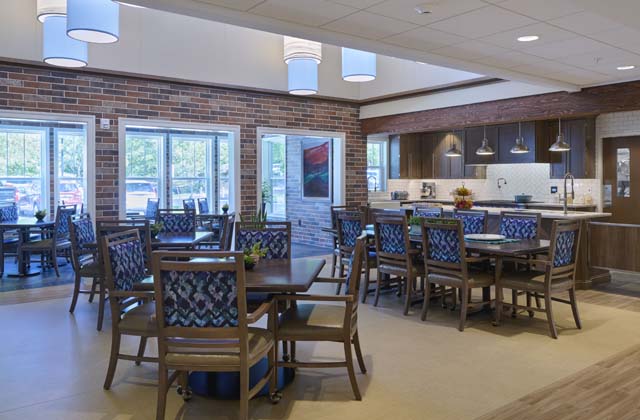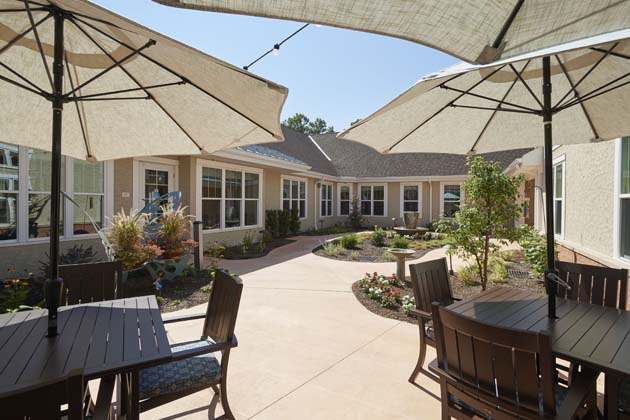Boutique Memory Care Facilities Designed for Tranquility and Compassion
Everything About Memory Treatment Services: Why Little Memory Care Homes Are a Fantastic Option
Memory treatment solutions play a crucial role in sustaining people with Alzheimer's and mental deterioration. Little memory treatment homes stand out for their individualized technique and intimate setting. With lower staff-to-resident ratios, these homes foster more powerful connections and tailored treatment. Homeowners take advantage of enhanced social communications and a safe setting. As family members check out alternatives, understanding the distinct benefits of small memory treatment homes becomes crucial. What factors should be taken into consideration when choosing the ideal home?
Understanding Memory Treatment Solutions
While numerous might know with general senior care options, recognizing memory treatment services is necessary for households encountering the obstacles of cognitive decrease. Memory treatment particularly provides to individuals with problems such as Alzheimer's illness and various other types of mental deterioration. These services give a structured atmosphere that concentrates on enhancing the lifestyle for homeowners with specialized treatment and support.Memory treatment facilities are designed to ensure safety and security and protection, usually featuring safeguarded environments to stop wandering. Trained personnel are offered around the clock to help with day-to-day tasks, medication administration, and individual treatment. Additionally, memory treatment programs often include cognitive stimulation activities, customized to involve locals and advertise mental well-being. Households can gain from understanding these services, as they allow educated choices regarding their liked ones' care, making certain that their specific needs and preferences are attended to in a encouraging and compassionate fashion.
The Benefits of Tiny Memory Care Houses
Small memory care homes offer distinct advantages that can significantly boost the lifestyle for homeowners with cognitive disabilities. One significant benefit is the intimate setting, which permits for customized communications among personnel and locals. This smaller setup cultivates meaningful partnerships, lowering sensations of seclusion and anxiousness commonly experienced by individuals with memory issues.Additionally, the lower staff-to-resident proportion in tiny memory care homes makes it possible for caregivers to provide more conscientious guidance and assistance. This strategy not only boosts safety however also advertises a complacency for the residents.Moreover, little memory treatment homes can adapt promptly to the special needs and choices of each homeowner, enabling for a much more homelike environment. Such an environment can urge social interaction and engagement in tasks, ultimately enhancing the day-to-day experiences of those coping with cognitive impairments.
Personalized Care Program for Locals
Individualized care strategies are vital in memory treatment homes, as they satisfy the special requirements and preferences of each local. These plans begin with comprehensive evaluations conducted by competent experts, who assess cognitive abilities, case history, and personal passions. This tailored approach assurances that care is not just efficient but additionally considerate of each person's self-respect and autonomy.Moreover, customized treatment plans are adaptable, allowing adjustments as residents' requirements advance with time. This versatility fosters a feeling of safety and knowledge, which is essential for people coping with memory obstacles. Caregivers are trained to execute these strategies consistently, providing assistance that lines up with the locals' regimens and preferences.Ultimately, customized care strategies enhance the lifestyle for citizens by promoting health, engagement, and self-reliance, making them an essential element of memory care solutions in tiny memory treatment homes.
Producing a Home-Like Atmosphere
Developing a home-like setting is crucial for cultivating comfort and experience in memory care setups, as it considerably impacts homeowners' emotional health. Small memory care homes often focus on tailored touches, such as cozy shade schemes, family pictures, and familiar furniture arrangements, which help locals feel more comfortable. Including elements similar to a conventional home, like comfy home and public locations, encourages a feeling of belonging.Moreover, utilizing natural light and outdoor rooms can enhance the environment, advertising relaxation and peace. Employee play a significant role in preserving this setting by involving with homeowners in a thoughtful manner, treating them like family. Regular tasks, such as cooking or gardening, can additionally add to a home-like feel, supplying possibilities for homeowners to take part in purposeful experiences. Overall, creating a supporting environment supports cognitive function and psychological security, making it an essential element of memory treatment solutions.
Improved Social Communication and Area
Boosted social interaction and neighborhood are necessary elements of memory care services. By fostering personalized social engagement and developing a family-like ambience, these services advertise meaningful links amongst citizens. Group tasks and occasions further urge engagement, helping people feel much more consisted of and sustained.
Customized Social Involvement
While social communication is necessary for overall wellness, several individuals with memory problems typically battle to engage meaningfully with others. Customized social involvement in memory treatment homes addresses this challenge by producing tailored activities that deal with locals' unique interests and abilities. By concentrating on private choices, caretakers can foster connections that reverberate deeply with each person. Activities such as art treatment, songs sessions, and assisted conversations advertise cognitive excitement and emotional expression. In addition, small team setups motivate camaraderie and permit even more intimate communications, improving feelings of belonging. This method not only battles sensations of isolation however additionally encourages residents to preserve a sense of identity, ultimately adding to improved mental health and wellness and high quality of life.
Family-like Environment
In a memory care setting, cultivating a family-like atmosphere significantly boosts social communication and develops a sense of area among citizens. Smaller memory care homes frequently focus on intimate environments, permitting residents to develop closer connections with each other and personnel members. This nurturing environment advertises depend on, which is crucial for individuals with memory disabilities. Citizens are most likely to talk and share experiences, creating a helpful network that minimizes feelings of isolation. The familiarity of shared rooms and regimens contributes to a feeling of belonging, even more motivating social communication (personalized memory care). In such setups, psychological bonds prosper, leading to improved general wellness and a greater quality of life for locals as they browse their day-to-day experiences with each other
Team Activities and Occasions

Safety And Security and Safety Features in Tiny Residences
Numerous small homes created for memory care include essential security and security attributes to guarantee the wellness of locals. These homes commonly use safe and secure access and leave factors to prevent straying, a typical problem among individuals with memory problems. In addition, monitoring systems and alarm system devices improve surveillance, making sure that staff can promptly respond to any kind of unusual activities.Interior formats are customized for safety, with reduced threats such as sharp edges and clutter-free pathways. Handrails and non-slip floor covering are usually set up to reduce the risk of drops. Team member are learnt emergency methods, guaranteeing they are planned for numerous situations.Moreover, customized care strategies may include analysis of private safety requirements, giving customized solutions for every resident. In general, these security and safety features develop a caring environment where residents can grow while keeping their self-respect and freedom.
Exactly how to Select the Right Memory Treatment Home
How can households guarantee they pick the most ideal memory treatment home for their loved ones? The decision requires mindful consideration of numerous variables. Families need to assess the facility's team certifications and training, making sure that caregivers are experienced in taking care of memory-related conditions. Next, it's essential to analyze the home's setting, concentrating on safety and security functions and whether it fosters a feeling of neighborhood and belonging. Checking out the center can offer insight right into daily activities and the social ambience, which are crucial for psychological stimulation and emotional health. Additionally, family members need to ask about the treatment strategies used, ensuring they are customized to private demands. Thinking about the home's location and access for family members sees can add to a smoother shift. By attending to these facets, households can make an educated decision that prioritizes their loved one's convenience and top quality of life in a memory treatment setting.
Frequently Asked Concerns
What Certifications Should Personnel Members in Memory Treatment Residences Have?
Team participants in memory treatment homes ought to have relevant qualifications, experience in mental deterioration care, solid interaction abilities, and concern. Continuous training in behavior monitoring and restorative interventions enhances their capacity to support locals efficiently.
How Do Memory Care Provider Differ From Typical Assisted Living?
Memory care solutions concentrate especially on individuals with memory problems, supplying specific support and organized environments. In contrast, typical assisted living supplies basic support with daily activities, doing not have the customized approach required for those with cognitive obstacles.
What Kinds of Activities Are Provided in Memory Care Residences?
Memory care homes generally supply a selection of tasks designed to engage homeowners. Common alternatives include art therapy, music sessions, cognitive video games, exercises, horticulture, and gatherings, all targeted at improving health and cognitive function.
Can Citizens Bring Their Own Valuables to Memory Care Homes?
Citizens can generally bring their very own personal belongings to memory treatment homes, allowing them to customize their living room - personalized memory care. This method helps develop a familiar setting, advertising convenience and a feeling of identity for the people

Exactly How Are Household Members Associated With the Treatment Refine?
Relative play a vital duty in the treatment process, usually joining decision-making, going to care meetings, and providing psychological assistance. Their involvement fosters a collaborative setting, boosting the resident's total well-being and lifestyle. While several might be familiar with basic senior care choices, comprehending memory care services is important for families encountering the obstacles of cognitive decline. These services give an organized atmosphere that focuses on improving the high quality of life for residents via specialized treatment and support.Memory care facilities are designed to assure safety and security and security, often including safeguarded environments to avoid roaming. Personalized care strategies are vital in memory care homes, as they provide to the unique demands and choices of each homeowner. Team participants in memory care homes ought to possess reference appropriate certifications, experience in mental deterioration treatment, strong interaction skills, and concern. Memory treatment solutions focus specifically on people with memory problems, offering customized assistance and organized environments.